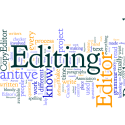This question used to drive me nuts.
Most folks know that my “formal” training in putting words together is fairly minimal, so for a long time I didn’t know that there were different types of editors, let alone what they were called. Editing was just the process of making written text better – I didn’t categorize it. Thus, my annoyance at, “what type of editing do you do?” The transition from not knowing what I don’t know to knowing what I don’t know can cause me to wonder if all the little voices in my head are really my own.
Once I was aware that different types of editing existed, I then had to figure them out and decide where I fit in. That, actually, turned out to be easier done than said because about the time I made the realization, I stumbled upon a sheet that defined several types of editors. <Insert Snoopy happy dance here>
After more research, I now know that the exact description and name of editor-types can vary, but I find that most people understand what I’m talking about (more or less) when I use the terms Developmental, Copy, and Line.
Developmental Editing
This is big-picture editing. Does the content (story) make sense? Are things consistent? Does it read well for the intended audience?
This can be truly bloody editing because this editor moves – or removes – entire paragraphs and questions everything. People also call this Substantive Editing.
Some people (including the Editor’s Association of Canada) actually draw a line between Developmental and Substantive editing. For them, Developmental Editors are involved with a project before there is even a project to edit. They help authors develop the work. On the other hand, a Substantive Editor comes in once there is a body of work to edit for style, clarity, order, and all that other bloody stuff.
I cite the Editor’s Association of Canada because their site was the first place I saw the distinction made between Developmental and Substantive editing. Since I lean more towards the Substantive – meaning I’m not the best person to help you figure out what to write and how to write it – I like to give them credit.
That said, most of the time, I see Developmental and Substantive used interchangeably. Whichever term, or phase of the project, these editors work closely with writers to make sure that what they write is actually what they want to say.
Copy Editing
Why “written matter intended to be reproduced in printed form” is defined as copy, I don’t know. And, I haven’t researched it all that much. Anyway, based on that definition of copy, I used to assume I was a Copy Editor. However, copy editing is not simply “the process of making written text better,” it’s a touch more detailed. Copy Editors get a little more precise with the process. Grammar, spelling, and fact checking are all in the realm of copyediting.
While Copy Editors may question something an author writes, they’re not the slash and burn types. This is why writers don’t generally hire them until the project is closer to done.
Line Editing
According to Andi Marquette, Line Editors “are the anal retentive microsurgeons of the editing world.” These people read less for content and more for precision. Is everything – grammar, punctuation, spelling, word usage or over-usage, etc. – absolutely perfect? If it weren’t the computer age, this person would literally make sure every “i” had a dot and every “t” a cross.
I’ve read different opinions as to when a Line Editor enters a project; I’m inclined to go for as late as possible. You certainly do not want to get this person involved before you have your facts, figures, or story in place. Why go through all that work when you’re still re-writing and moving things around?
So, What Kind of Editing do I do?
I am a Substantive Editor. Do not give me something you are not willing to have returned covered in green ink. I’ll point out inconsistencies, rearrange paragraphs, re-write or insert text, and ask you all sorts of questions. I edit for readability because I know that grammatically correct and readable are not always the same.
However, I will assume you know what you are talking about and not do your fact checking – unless I’m curious or in serious doubt.
That said, I think every editor does a little bit of all the types. I’ll fix grammar, and I am adamant about the Oxford comma. On the other hand, I keep the Word grammar checker on for the finer points and am dependent on the spell checker available with every software package available.
-Lorrie Nicoles

